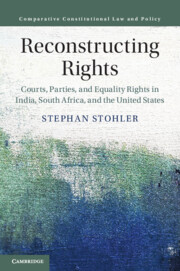 Reconstructing Rights
Reconstructing Rights from Part I - Introduction
Published online by Cambridge University Press: 09 July 2019
I use a puzzling episode of judicial interpretation from South Africa to motivate the theoretical question about why judges sometimes alter their commitments to some legal interpretations but not others. I examine existing scholarship, which tends to portray judges as behaving in four distinct ways when engaged in legal interpretation: as guardians; as principled interpreters; as regime partners; or as strategic interpretors or deliberators. I argue that each of these portrayals falls short in explaining judges' shifting commitments to legal interpretation. Instead, I argue that judges are best understood as behaving as deliberative partners by combining key theoretical aspects of existing work into a novel theoretical position. I then outline the unique observable implications of each position and propose a fair test that examines judicial behavior in response to political parties' shifting stances on equality rights during key moments in Indian, South African, and American history.
To save this book to your Kindle, first ensure no-reply@cambridge.org is added to your Approved Personal Document E-mail List under your Personal Document Settings on the Manage Your Content and Devices page of your Amazon account. Then enter the ‘name’ part of your Kindle email address below. Find out more about saving to your Kindle.
Note you can select to save to either the @free.kindle.com or @kindle.com variations. ‘@free.kindle.com’ emails are free but can only be saved to your device when it is connected to wi-fi. ‘@kindle.com’ emails can be delivered even when you are not connected to wi-fi, but note that service fees apply.
Find out more about the Kindle Personal Document Service.
To save content items to your account, please confirm that you agree to abide by our usage policies. If this is the first time you use this feature, you will be asked to authorise Cambridge Core to connect with your account. Find out more about saving content to Dropbox.
To save content items to your account, please confirm that you agree to abide by our usage policies. If this is the first time you use this feature, you will be asked to authorise Cambridge Core to connect with your account. Find out more about saving content to Google Drive.